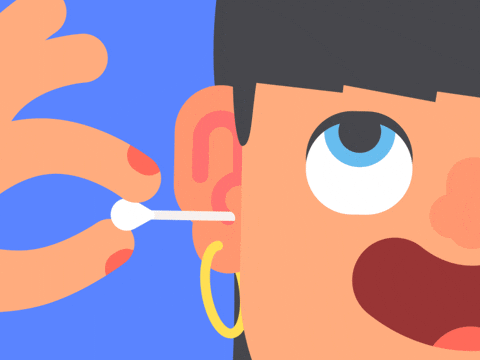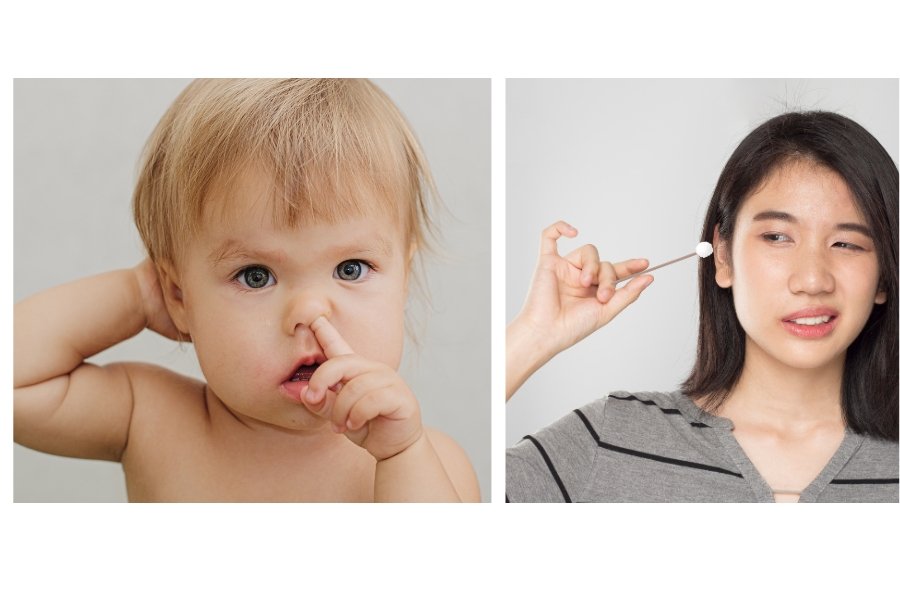In a world where so many of us disagree on everything—from politics to parenting to pizza toppings—one thing might just be the bridge that binds us: the belief that boogers are grosser than earwax. As with all topics, we can’t say this definitively, as some obviously might disagree.
On Quora, someone posted the age-old question, “Why is picking my nose gross, but scratching my ear is not?“
In one helpful answer, a person writes in part, “I believe it’s because picking one’s nose is a form of elimination, the technical term learned in school biology class for the physical expulsion of waste products from the body. Hardly anyone wants to watch that, is my point, outside of certain specific contexts.”
However, they add, “The poet Sylvia Plath, in her journal, wrote a wonderful and rapturous description of the pleasure of extracting a giant and complex booger from her nose. Scratching one’s ear, by contrast, is trivial, compared to the queasy spectacle of a truly dedicated nose-picker. At least, that’s my take on the matter.”
Another commenter shockingly weighs in with what seems to be empirical evidence: “The actual reason is that boogers taste good, while earwax tastes terrible. That means you don’t have to dissuade kids from sticking their fingers into their ears, but you do have to teach them not to stick their fingers in their nose. The bad taste means people only scratch their ears because they actually itch, not because they enjoy eating the earwax.”
There are countless threads/questions relating to the matter. Queries like, “Was picking your nose always considered gross and embarrassing?” and “Why is it okay to pick your ears as opposed to picking your nose?” One person pushes back: “Picking your nose is actually comparable to picking wax out of your ear. Both are gross.”
Another person adds a little scientific context: “Frankly, it could be harmful to pick either your ears or your nose. Traumatizing the skin of the ear canal may lead to an infection called otitis externa, which can be painful and especially dangerous in diabetics. Picking your nose can cause inflammation and possibly infection of the hair follicles of the nasal vestibule. This is a problem because inflammation in this area can become a chronically painful nuisance. So… don’t pick either your nose OR your ear!”

Let’s turn to some experts for more insight. First, let’s break down the distinction between snot (AKA mucus) and earwax. According to audiologists on the podcast Let’s Dive In, snot and earwax serve a similar purpose. Pete Duncan says both are “a protective way of stopping bacteria, and other things you don’t want, helping move it out. It acts as a filter.”
How are they different? On the YouTube channel Cosmos Science Magazine News, the distinction is explained (throwing in “eye goop” for good measure). Earwax, they share, is “a goopy yellow secretion called cerumen [that] protects the skin and lubricates the ear.” Snot, however, is a “watery secretion high in protein and protective enzymes.” Also, mucus “catches dust particles and microorganisms before they can enter the body.”
Could protein be the answer? Some might assume it answers the contentious question of why people are even drawn to picking their nose in the first place. Sadly, in Business Insider,, they emphatically state, “Sorry to say, there’s zero scientific evidence to support any health benefits from eating your boogers.”
Lauren Gelman’, a writer for The Healthy, a Reader’s Digest Brand, writes in her piece, “Guess Which of These Gross Habits Are Really Healthy,” that doctors conclude, “Earwax is healthy and necessary; it protects your ears and has antibacterial properties, and too little earwax can leave your ears dry and itchy, according to the American Academy of Otolaryngology.” (She urges people to throw out their Q-tips.)

But when it comes to snot, while it also serves a purpose, she says the jury is still out in terms of “eating it.” “It’s high on the ick factor, but a Canadian professor of biochemistry has wondered whether his young daughters’ habits of picking their nose and eating what comes out could be good for them.” She cites a professor who “posits that consuming your boogers can prime your immune system to detect germs.” Though, she clarifies, “Vanderbilt University infectious disease specialist William Schaffner, MD, told ABC News that ‘it’s not likely that eating boogers would offer much additional immune system support, because people already unconsciously swallow nasal mucus.’”
At the end of the day, what’s considered “gross” is pretty subjective. But experts do agree: picking at any part of your body does more harm than good, no matter how delicious some might find it.







































